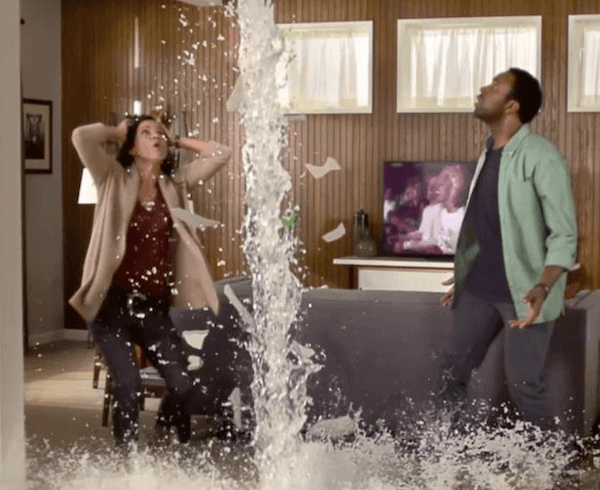Water damage is one of the most devastating things that can happen to your home, and fixing it can cost thousands of dollars.
The sooner you catch water damage in your home, the less you will have to pay in order to fix it. Know the signs, and call your contractors as soon as possible should you see that your home has water damage.
How to Clean Flood Damage?
After the devastating flood has ravaged one home, cleaning the flood damage is a daunting task that needs to be done meticulously. First, wear waterproof boots and gloves for protection. Floodwater is contaminated with lots of mud and other particles picked up along the flood’s path causing water damage, it is hazardous to one’s health. Badly soaked wallpaper due to water damage must be removed, however; washable wallpaper can be cleaned using soap or detergent.
The foundation must be inspected for movement to make sure it is safe after the flood damage. The basement area will need to be pumped out a little each day. If this task is done too quickly the water pressure outside the basement will be too much and result in the ceiling collapsing and further flood damage. Wood flooring must be dried out slowly to prevent cracking. A dehumidifier must then be used to clean furniture to prevent mold from forming due to water damage.
Dealing with Water Damage and Mitigation Process
Restoration companies use dry-out equipment in every water damage job in order to start the mitigation process right away and to avoid secondary damages.
The first step in beginning water damage remediation services starts with detecting where the wet area and the source of the water damage are coming from. Water damage companies will use Infra-Red Cameras to detect the wet area and according to its report, we will know where the affected wet areas are and the water damage dry out process can begin.
Before experts are able to use dry-out equipment, the technicians will start to extract the water and remove all affected building material. Professionals will use dehumidifiers to control moisture. In case the water damage is considered as category 1 or category 2, technicians will add air movers in order to enhance airflow and seek equilibrium faster.
In cases where water damage category 3 is in places such as sewage damage and toilet overflow, air movers will not be used instead air scrubbers will be added in their place due to the contaminants and bacteria in the environment that you do not want spread throughout your property. The entire Water damage dries out process usually takes between 3 to 5 days depending on how big the loss is.
If you want to avoid high prices on repairs, it’s crucial that you learn early (and often less conspicuous) signs of water damage. If you notice any of these issues in your home, call a water damage expert as soon as you can.
- You smell mildew, moldy, musky stench in your home. This is one of the clearest signs of water damage that you can have in a building. This also rings true about actually SEEING mold on your walls, furniture, or floors. Should you start smelling mold, run to the phone and call for help. Certain kinds of mold can be lethal to people!
- The paint on your living room walls isn’t looking as good as it once did. Normally, wall colors will fade over the course of years. However, a commonly overlooked sign of water damage is when the paint on your walls begins to flake or chip. You may want to reach out to an inspector to see if your home has water damage if the paint’s beginning to chip.
- Things are starting to resemble a Salvador Dali painting at home. Notice any bowed walls? Warped floorboards? Wood will warp, bend, and curve when it’s exposed to large quantities of water over a period of time.
- You’re noticing an uptick in pest infestations. Pests love water. If you notice more pests along with any other signs of water damage, you should be very concerned.
- You recently experienced a flood, or you have noticed pools of water gathering in or near your home. Should this be the case, call an inspector or your home insurance company immediately. You have serious water damage.
- Your home’s masonry, caulk, roofing or general exterior is showing signs of degeneration. Loose bricks, shingles, and caulking around your windows will cause water damage. If there is a lot of damage to your exterior, you can expect there to be a lot of damage to your home’s interior as well, too. In this case it could be of your best interest maybe start using a miami property search to look for a restoration third party vendor service to get your property fix as fix as possible.
- You’re noticing a draft…or dampness in the air. Both are signs of water damage.
- The plumbing isn’t what it used to be. If you are experiencing leaks, water pooling around your sink, gurgling noises coming from your toilet, or similar plumbing issues, the chances of having water damage due to your home’s plumbing is pretty high.
Here’s a video of a quick temporary solution for a water-damaged ceiling.


